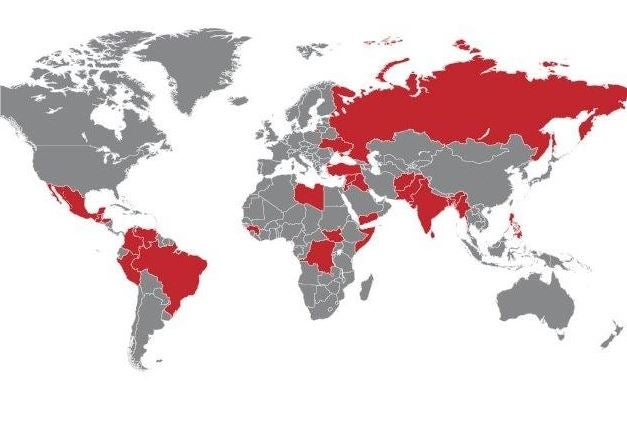
A total of 93 journalists and media professionals were killed in 2016
according to new figures from the International Federation of
journalists (IFJ), the the world’s largest journalists’ organisation.
A further 29 media workers died in two aircraft crashes, said the IFJ,
which represents 600,000 members in 140 countries, as it published its
annual list of work-related deaths.
The killings including targeted murders as well as bomb attacks and
cross-fire incidents in 23 countries in Africa, Asia Pacific, the
Americas, Europe and the Middle East and the Arab world.
The federation said that the figures for 2016 were down on previous
years, but warned against complacency, citing reports of rising threats,
intimidation and self-censorship as evidence that attacks on freedom of
expression remained at critical levels.
It said that in addition to the 93 targeted killings, 20 Brazilian
sports reporters perished in a plane crash over the city of Medellin in
Colombia, a country where for the first time in many years no killing
was recorded this year (three killings were listed in the IFJ’s 2015
report), while nine Russian journalists killed in a military plane
crash.
The 2016 toll is lower than the 112 killings reported the previous
year.
Year on year country comparisons show there have been decreases in the
number of killings in a range of countries including Honduras, Libya,
the Philippines and South Sudan.
But levels of violence were higher in Afghanistan, Guatemala, Iraq and
Mexico. Furthermore, countries such as Yemen, India, Pakistan and Syria
saw little or no change in the numbers of killings compared to last
year.
The devastating terrorist attack on the French satirical magazine
Charlie Hebdo at the start of 2015, was mirrored by another attack in
January 2016 aimed at causing massive loss of life in Afghanistan when
the Taliban attacked a staff van of TOLO TV, killing seven journalists
and support staff, after having declared the TV station to be a military
target.
The IFJ figures showed that in 2016 the Arab World and Middle East had
the highest killing tally, with 30 deaths, followed by Asia Pacific with
28, Latin America with 24, Africa with eight and Europe with three.
The IFJ reported the following totals:
Targeted, bomb attacks and cross-fire killings: 93
Accidents and Natural Disasters Related Deaths: 29
Total number of deaths: 122.
The countries with the highest numbers of media killings were:
Iraq: 15
Afghanistan: 13
Mexico: 11
Yemen: 8
Guatemala: 6
Syria: 6
India: 5
Pakistan: 5
The IFJ compiles the annual list of journalists and media staff killed
from information from affiliated organisations and other credible
sources, after having established a clear or reasonable link between the
killing and the victim’s professional activity. But it warned that while
every effort was made to consider all cases which were publicly known,
the list did not pretend to include all killings of journalists and
media staff.
IFJ president Philippe Leruth said: “Any decrease in violence against
journalists and media staff is always welcome but these statistics and
the continued deliberate targeting of media workers in many incidents
causing loss of life give little room for comfort nor ground for hope to
see the end of the current media safety crisis.
“These levels of violence in media should spur into action all those
committed to protecting journalists. There must be no impunity for those
crimes. The IFJ and its affiliates around the world will redouble
efforts to mobilise for credible steps to remove the shadow of violence
over journalism.”
IFJ general secretary Anthony Bellanger said: “The number of journalists
and media staff killed for doing their work could be higher if it
weren’t for lack of credible information on these missing cases and for
the self-censorship by journalists in some countries to avoid drawing
the unwelcome attention of crime barons.
“There is therefore urgency in pressing governments to investigate all
forms of violence, including killings and disappearances in a speedy and
credible manner to protect the physical integrity and professional
independence of journalists.”
Natiuonal Union of Journalists general secretary Michelle Stanistreet
said: “Remembering our many colleagues around the world who have made the ultimate sacrifice for their dedication to their work is a salutary
reminder of the dangers and risks facing far too many journalists.
“Our collective campaign to halt impunity – a scourge that serves as a
protective shield for enemies of press freedom – is more vital than ever
as we enter a year that will inevitably translate political uncertainty
and instability into more attacks on journalists and journalism.”
Bishop Auckland Labour MP Helen Goodman, chair of the NUJ parliamentary group, said: “Some parts of the world are extremely violent. We only know about what is going on because of the work of very brave
journalists and war correspondents. Without them the public would not be
in a position to pressure governments over policy or donate to the
relief charities. We owe these journalists, photographers, and
interpreters a huge debt. I salute them.”
Shadow culture, media and sport secretary Tom Watson said: “The number of media professionals killed in 2016 is a sobering reminder that too many journalists pay the highest price possible in the course of doing
their jobs.
“It is thanks to them and others like them that we know the truth about
what is happening in places that are afflicted by war, terrorism or
state-sponsored violence.
“Governments must do all they can to ensure that journalists who do the
most dangerous jobs are protected as they go about their work. In
increasingly uncertain times, now more than ever, the world need robust
and uncompromising journalism.”
Email pged@pressgazette.co.uk to point out mistakes, provide story tips or send in a letter for publication on our "Letters Page" blog
